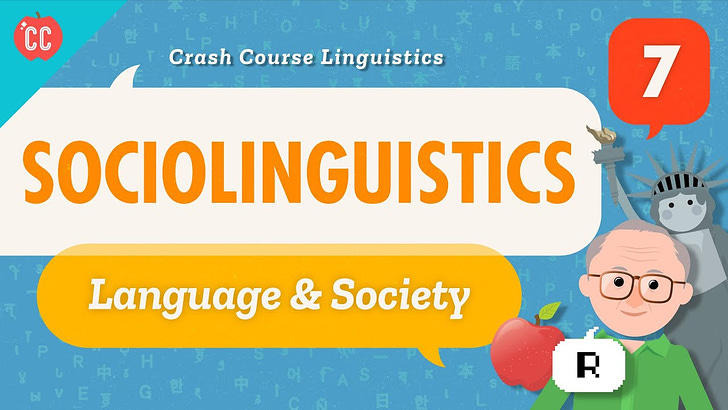Week 7’s Crash Course Linguistics video highlights how variation in language can reflect social identities.
Topics include how sociolinguistic variation is studied and why it matters. This week's Thought Bubble is a visit to the department stores of New York City to see sociolinguistic variation in action. Closed captions are available in English.
For more information about linguistic variation in signed languages, check out Do sign languages have accents?, a 4-minute video from Gallaudet University and Mental Floss demonstrating regional and foreign accents in American Sign Language. Closed captions in English are included as part of the video. Thanks to Dr. Julie A. Hochgesang of Gallaudet University for creating and sharing this resource earlier!
To learn more about sociolinguistic variation involving intonation, listen to What does it mean to sound Black?, a 44-minute episode of the Lingthusiasm podcast which includes an interview with Dr. Nicole Holliday. This episode is available wherever you prefer to find podcasts, and a transcript is available here.
This week's activity is the Cambridge Online Survey of World Englishes. At the time of this newsletter's publication there are technical issues with the maps that show where different variants are used, but it remains a great source of questions about linguistic diversity to spark discussion among your English-speaking students.
UPDATE: Dr. Bert Vaux has kindly suggested additional links with more information about linguistic variation within US English: maps categorized by the type of variation (lexical, morphological, etc.) and an interactive survey that shows a map for each response a user gives.
Finally, see the Resource Guide we shared in the spring for videos, diagrams, and activities relevant to varieties of English around the world, as well as past newsletters with video resources about sociolinguistics and linguistic discrimination.
Coming next week: resources about phonetics, focusing primarily on consonants!
Liz, Gretchen, and Lauren
About Mutual Intelligibility
Mutual Intelligibility is a project to connect linguistics instructors with online resources, especially as so much teaching is shifting quickly online due to current events. It's produced by Lauren Gawne and Gretchen McCulloch, with the support of our patrons on Lingthusiasm. Our editor is Liz McCullough.
Mutual Intelligibility posts will always remain free, but if you have a stable income and find that they’re reducing your stress and saving you time, we're able to fund these because of the Lingthusiasm Patreon and your contributions there.
For the 16 weeks of Crash Course Linguistics, Mutual Intelligibility will be sharing the video weekly, along with supporting resources. We will resume our regular link request and recommendations after the Crash Course Linguistics series. For more on how we usually operate, check out our about page.
If you have other comments, suggestions, or ideas of ways to help, please email mutual.intellig@gmail.com.



